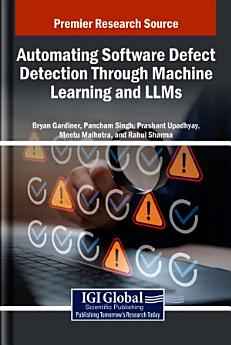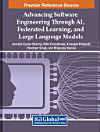Automating Software Defect Detection Through Machine Learning and LLMs
About this ebook
Automating Software Defect Detection Through Machine Learning and LLMs explores how cutting-edge technologies like machine learning (ML) and large language models (LLMs) transform software detection. It examines how these technologies enhance accuracy, scalability, and efficiency in identifying and mitigating software defects. This book covers topics such as algorithms, fraud detection, and software engineering, and is a useful resource for engineers, security professionals, academicians, researchers, and computer scientists.
About the author
Pancham Singh is currently working as an Assistant Professor in the Department of Information Technology at AKGEC, Ghaziabad since 2007. Mr. Singh has over 18 years of teaching and one year of industry experiences. Mr. Singh received a B.Tech. Degree in Computer Science & Engineering from Dr. A.P.J. Abdul Kalam Technical University (formerly, UPTU), Lucknow, Uttar Pradesh, India in 2005; a Master Degree in Information Technology from RTU, Kota, Rajasthan, India in 2013 and a Pursuing PhD from Netaji Subhas University of Technology (NSUT), New Delhi, India since january 2023. In addition he has authored 3 books in Computer Science. He has presented and published more than 40 papers in international journals and conferences. He has reviewed more 50 papers for the International Journals and Conferences. In addition he has published 20 National and International Patents and 3 Design Grants. He was the session chair for the International Conference ICDT 2024. In addition, He did work as a time table In-charge since 2010 to 2023 for more than 13 yrs also media In-charge since 2015 to 2023 for more than 8 yrs in AKGEC. He did Flying Squad Duty assigned by AKTU as a In-charge and team member 4 times. He has attended more than 30 FDPs and did work as a In-charge and member for NBA and NACC in AKGEC. His research interests are Machine Learning, Deep Learning, Blockchain, Internet of Things, and Software Engineering.
Prashant Upadhyay is an Assistant Professor at, the Department of CSE, School of Engineering and Technology, Sharda University Greater Noida, Uttar Pradesh, India. He submitted his doctorate of philosophy (PhD) in Computer Science and Engineering, from Gautam Buddha University, U.P. He received his M.Tech (CSE) from ABES Engineering College, U.P in 2016. He has done B.E. from Vindhya Institute of Technology and Science, M.P in 20012. He has more than 5 years of teaching and research experience. He published more than 15 research papers in internationally reputed journals indexed in Web of Science, SCOPUS & SCIE and top-rank conferences as author or co-author. His research findings are published in Archives of Computational Methods in Engineering Springer, Neural Computing and Application Springer, IGI Global USA, IEEE Xplore. He served as a TPC and reviewer in Various International Conferences. He is the Editor of Books: Enhancing Medical Imaging with Emerging Technologies, Future of AI in Medical Imaging, Internet of Vehicles (IoV): The Characteristics, Challenges, Architectures, Platforms, Algorithms and Use cases, Digital Deception: Uncover the Dark Side of AI in Social Networking. He served as session chair in several international conferences- ICDT-2024, ICDETGT-2023, and ICDT-2023. He has authored a book for Wiley Publication- Introduction to Python, ISBN: 978-93-5746-219-8. He has published three Indian patents in the years 2022 and 23. His research area includes Computer Vision.
Meetu Malhotra Researched on implementation and deployment of short-term forecasting model to predict US vehicles sales at National and State-Make-Model level, on time series data, using hybrid approach involving machine learning algorithms - AutoTS, XGBoost, FBProphet and DeepAR; used AWS (lambda, Batch, Eventbridge, EC2, Sagemaker) and Gitlab platform and Python programming language. • Created dashboards for data visualization and analysis and presented the results to stakeholders. • Achieved a significant improvement by lowering the error rate from 23% to~ 3% for the major automotive brands
Rahul Sharma received his Ph.D. degree from Tallinn University of Technology (TalTech), Estonia, and Postdoctoral Fellowship from the Karlsruhe Institute of Technology (KIT), Germany. He also served as a Head of the Information Technology Department at Ajay Kumar Garg Engineering College, Ghaziabad, where he provides academic leadership, drives curriculum development, and mentors undergraduate and postgraduate students. Rahul’s research focuses on the application of Artificial Intelligence, Data Science, and Large Language Models (LLMs) to enhance knowledge management, automated documentation, and intelligent decision-making. He has delivered several courses, seminars, supervised Ph.D. and Master’s students, and actively fosters collaborations with interdisciplinary research groups across Europe and India. He is recognized for his passionate dedication to research and dynamic leadership in advancing scientific knowledge and innovation. [Editor]




